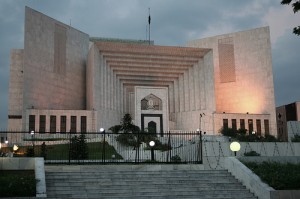Supreme Court issue complete verdict of its December 31st order on Memogate
Thursday, January 12th, 2012 8:28:45 by Fayyaz Yaseen
Supreme Court issue complete verdict of its December 31st order on Memogate
Islamabad: (Thursday, January 12, 2012) The Supreme Court has issued complete verdict of its order on December 31 on Memogate issue.
The detailed 81-page order on the case has been written by Chief Justice of Pakistan, Justice Iftikhar Muhammad Chaudhary, while senior judges including Justice Jawwad S. Khawaja, Justice Afzal and Justice Ejaz Afzal have written
notes on it.
The detailed order of the court stated: "On receipt of reply from Chief of Army Staff and D.G., ISI, copies of the same were handed over to all the parties for re-joinders, if any, by means of order dated 15.12.2011. No reply contradicting
statement of both the respondents was filed, except vide CMA 5539/2011 Ms. Asma Jahangir filed affidavit, received from James Logan Jones, which he has not sent though Embassy of US nor the Government or to the Registrar of this Court. This affidavit, however,
has been contradicted by Mansoor Ijaz, copies of which have also been supplied to all concerned. Interestingly, the Federation despite knowing all these facts had not taken position in respect of events which have been pointed in the concise statement of the
Chief of Army Staff and D.G. ISI. For sake of arguments and to be on safe side at the moment without discussing or taking into consideration the statement of Mansoor Ijaz (respondent No.4) and James Jones, prima facie it is established that a Memo was drafted
and prepared, which was sent to Mike Mullen, who initially denied its existence but later he admitted that he received such a Memo. Reference to the statement has been made in Constitution Petition No.79/2011 (Mohammad Nawaz Sharif v. Federation of Pakistan).
These assertions are important to, prima facie, draw an inference that the memo episode has an impact on national security. The contents of memo, if believed to be true, primafacie, are tantamount to compromising the security, sovereignty and CONST P 77-85,
89/2011, etc. 46 independence of the country. It is not desirable to discuss its contents, lest it should cause prejudice to either parties".
"After having heard the parties and having taken into consideration the relevant provisions of the Constitution and the law, judgments cited on behalf of both the sides and the pleadings of the parties carefully, we hold as under:-
(a) In exercise of powers of Judicial Review, we hold that in these petitions, petitioners have succeeded in establishing that the issues involved are justiciable and question of public importance with regard to enforcement of
fundamental rights, prima facie, under Articles 9, 14 and 19A of the Constitution has been made out. Thus, the CONST P 77-85, 89/2011, etc. 7 petitions under Article 184(3) of the Constitution are maintainable.
(b)To delineate measures with a view to ensure enforcement of the fundamental rights noted in para ibid, a probe is called for to ascertain the origin, authenticity and purpose of creating/drafting of Memo for delivering it to
Chairman of the US Joint Chiefs of Staff Admiral Mike Mullen through Gen. (Retd.) James Logan Jones, former US National Security Advisor."
Justice Ejaz Afzal Khan in his note wrote: "I have gone through the judgment authored by my lord the Chief Justice. It is complete and comprehensive in all respects. Reasons recorded and the case law referred are so persuasive and powerful that one cannot have
any other choice but to agree therewith. I respectfully agree with the judgment thus authored. However, I would like to add a few words to illustrate nexus between security of person and State and dignity of person and State and also nexus between a right
and its different implications and manifestations".
"Security of person is one of the most important fundamental rights. It is inextricably linked with the security of the State. If and when a person performing functions in connection with the affairs of the Federation acts in a
manner which imperils the very existence of the State a writ of prohibition or any other appropriate writ, according to the circumstances of the case could be issued against him. A petition filed by a citizen asking for the issuance of an appropriate writ
cannot be declined simply because his fundamental right has not yet been infringed. A narrow and pedantic interpretation may lend support to the argument that security of person is not imperiled or infringed by a mere threat to the security of the State, but
actually it is otherwise."
"Security of person in the absence of a strong, secure and stable State would be inconceivable. It would be as imaginary as drinking water from a mirage. Therefore, fundamental right of person would stand infringed the moment something
tending to imperil the security of State is done."
Short URL: https://www.newspakistan.pk/?p=9068

















